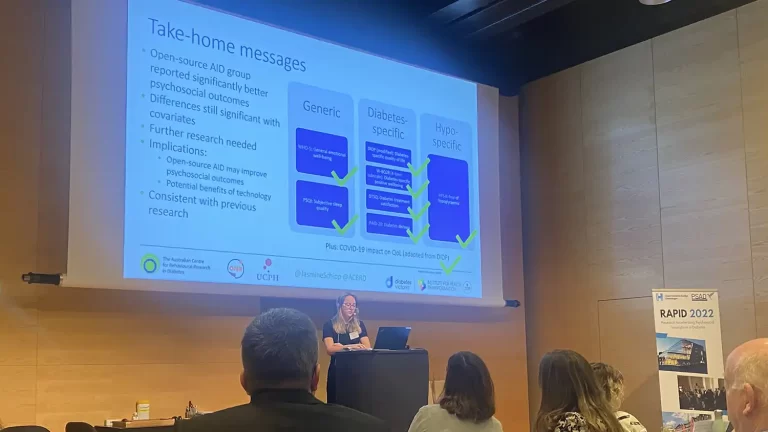Psychosocial Aspect of Diabetes (PSAD) Study Group
Research Accelerating Psychosocial Innovations in Diabetes (RAPID) Conference
Copenhagen, Denmark, Day 2 30th November 2022
After a delightful dinner and lovely evening of networking at the end of day 1, the vibe in the room today for day 2 is more relaxed with many professional friendships having been made already – amazing how easily genuine connections can be made when you’ve found your tribe, be it a professional or peer tribe…so from this sense it seems professional networking and relationship building is very similar to how PwD make peer connections 😊 Therefore, I reckon if PwD come across a health professional that is seems resistive against supporting the concept of peer support for PwD then perhaps remind them of this which I explain here!!
Dr Debbie Cooke from Atlantis Health and University of Surrey UK started day 2 off by reiterating how grateful PSAD was for the Novonordisk grant they received that enabled PSAD to provide this RAPID Conference. PSAD’s vision for this RAPID Conference was to build research capacity and support Early Career Researchers (ECRs) and to “create a spark” that fosters collaborative idea brainstorming amongst delegates from across the globe 😊
So on that note, day 2’s first key note speaker was Prof Richard Holt, an Endo from Southampton UK, who talks us through where we have come from and where we are going with supporting people with diabetes and a severe mental illness…
The dual burden of diabetes and severe mental illness
Prof Richard Holt
Evidence tells us people with severe mental illness and diabetes have a lower life expectancy of ~15 years less, which has been widening over recent years and is largely driven by physical health problems ie. COPD, diabetes, influenza, and pneumonia.
Conducting research in diabetes and mental illness attracts challenges though as the participants are often experiencing psychoses and delusions, which makes consent an ethical challenge.
Diabetes complications for PwD with severe mental illness don’t seem to be any more prevalent, except for metabolic concerns (ie. hyperglycaemia).
So what should our objectives for people with severe mental illness be :
- Prevent diabetes
- Diabetes screening
- Support diabetes management
In addition to this cohort having diabetes and a severe mental illness, the rates of obesity have doubled for them too.
Lifestyle intervention is now very much the global go-to for diabetes management for all :
- Dietary advice
- Physical advice
- Behavioural change advice
In the UK, the DESMOND program was converted to the STEP WISE program that was specifically for people with mental illness who also have diabetes. Its pros were it’s long term, gradual and supportive…BUT it wasn’t successful. The CHANGE program with a lifestyle coach also didn’t yield the lifestyle results that were being hoped for. So, the question was asked, do we turn away from offering lifestyle intervention programs to this cohort? The short answer remains NO!
One thing that keeps Prof Holt going with supporting PwD who have a severe mental illness is of the hearing of their lived experience reports about their successful use of pharmacotherapy. The burden of managing more than one chronic condition should not be underestimated – it’s complex, not linear.
In the research though…
The ‘bad news’ from a 2009 study was :
- Poor outcomes were compounded by healthcare services that weren’t suitable for this cohort
- This cohort are less likely to have received diabetes education or be prescribed statins
- This cohort weren’t likely to have received complication screening
The ‘good news’ from a 2021 study was :
- PwD were engaging with team more frequently
- PwD were more likely to now be receiving complication screening
The DIAMONDS Programme was developed by the University of York, which :
- Involves peer support sessions
- Involves 1:1 consults
- Includes digital app and workbook
The FUSION Clinic set up by Slaglese Denmark highlighted :
- PwD were receiving care from same clinician who specialises in both diabetes and psychology
- The clinic functions like a one stop shop concept
This key note presentation then took us to the ‘Depression and Diabetes Distress’ oral presentations…





PROACTIVE : an intervention delivered for depression among adults with diabetes in Brasil
Carina Nakamura
750 participants
3 day training for those providing the program
Also seen by a psychologist
Collaborative care included their usual routine care and medication prescriptions; the research program didn’t interrupt clinical care
Digital app involved activities to be completed by the end of study intervention as well as watching some videos via the app
Overall, this study intervention was successful with improving and reducing experiences of depression for PwD
Depression in patients with type 2 diabetes and risk factors – an Indian cross-sectional observation study
Dr Sandeep Tak
430 people with type 2 diabetes
52% had depression
92% had suboptimal glycaemic control
There was a correlation between HbA1C and severe depression
The mean duration of having diabetes was 9.3 years for those with depression
Insulin use was associated with higher depression score
There was a correlation between having diabetes complications and depression
***To conclude : screening is very important for those once having lived with type 2 diabetes longer than 4 years
Disturbed eating behaviour , diabetes distress and emotion regulation in people with type 1 diabetes : results from Dutch-Italian Study
Jiska Embaye
Young adults and women are most vulnerable for disordered eating.
People with type 1 diabetes are twice as high a risk for developing it.
Be mindful about food intake and weight management.
Be mindful of hypo episode frequency due to binge eating that naturally follows on from having hypos.
Be mindful of insulin administration routines/patterns given its weight gain component.
It’s not actually the eating behaviour that is the issue, it’s the emotional regulation, or lack thereof that causes the issue.
The more people use suppression of food intake, the more food intake they actually have.
33.7% experienced disturbed eating behaviours.
Disordered eating is associated with higher BMI, younger age, higher HbA1C and lower TIR.
Disordered eating also showed that the more diabetes distress present, the more suppression exists.
No differences found between Dutch and Italian centres.
Sample population consisted of higher educated women, but no association found between this and disordered eating behaviours and there was no association either for women without diabetes.





Endothelial dysfunction and brain white matter connectivity in individuals with and without diabetes : The Maastricht study
Magdalena Beran
Endothelial dysfunction and brain wave connectivity has been associated with people with type 2 diabetes.
Aim of study : can plasma biomarkers be used to determine relationship between endothelial dysfunction and brain white matter connectivity?
For greater endothelial dysfunction this suggests the brain is less integrated indicating a higher metabolic effect.
** note the study adjusted for CVD and glycaemia
Endothelial dysfunction is suggestive of being connected to brain disorders, which could then guide intervention study designs.
After morning tea, we were all privileged to attend an incredibly dynamic, innovative, thought provoking and inspiring session on diabetes stigma…
dStigmatising Diabetes : addressing stigma and its impact
Presented by Matthew Garza
dStigmatisation information dissemination platforms :
- The diaTribe foundation – newsletter
- TIR coalition – global program to adopt CGM TIR
Diabetes stigma prevention is training society to look at things a different way :
- Type 2 diabetes inherits shame and blame
- Type 1 diabetes inherits unknown/unaware questioning
Stigma is also still prevalent within the diabetes community itself; reacting to diabetes stigma may be a defence mechanism for one diabetes community, whilst stigmatising the other diabetes community.
SO, WE MUST ALL BE UNITED TO CHANGE THE NARRATIVE!
Most studies looking into stigma are pilot studies looking into how health professionals understand stigma so language and attitude can change.
Need more research looking into how the media/marketers understand stigma and how people without diabetes understand stigma.
dStigmatise.org launched this year 😊
“Stigma is everywhere…it’s a culture…which is motivating because we can change cultures, collaboratively” (Emma Davidsen, PhD Candidate)
“The way that diabetes stigma is framed by community frames how we as a society respond to the diabetes epidemic” (Shane O’Donnell, Community representative)
“It’s annoying that society and health services/professionals focus so hard on lifestyle interventions/modifications because it worsens the diabetes stigma and diabetes epidemic by assuming that all diabetes can be prevented by changing lifestyle…which is simply not true” (Jane Speight, ACBRD)
Emma Davidsen very succinctly described that the intracommunity diabetes stigma needs to be broken down and eliminated.
Stigma can be internal and external experiences, but both are interrelated.
In Saudi Arabia children with type 1 diabetes cannot attend school or go on trips/camps so discrimination is very real.
Jane talked about self-stigma eluding to the fact that individual’s socio-cultural environment can be stigmatising, which is very true for women with gestational diabetes from Aboriginal, Torres Strait Islander as well as Culturally and Linguistically diverse communities.
After lunch we heard oral presentations from the ‘Diabetes Distress, its impact and psychosocial interventions’ session…
Using tailored visual dialogue tools to address the psychosocial impact of diabetes in adults with new onset type 1 diabetes – a feasibility study
Mette Due-Christensen
Half of those diagnosed with type 1 diabetes are adults and they just like children have specific needs.
Research participants in this study were reassured to participate because the dialogue tools were designed by others living with diabetes.
Outcomes achieved :
- Normalised feelings that previously PwD hadn’t thought they could normalise them
- Developed connections
- Health professionals acknowledged that psychosocial elements of diabetes were important to discuss and that they felt comfortable to talk about it – but this was a discrepancy with what the PwD thought
A nurse-led group intervention to reduce diabetes distress among adults with type 1 diabetes – a codesign and feasibility study
Vibeke Stenov
Diabetes distress is very high (20-40%) and is linked to reduced quality of life.
This feasibility study had a clear reduction in diabetes distress.
Themes that emerged from this study :
- Verbalising and labelling emotions
- Peer support reduced loneliness and normalised emotions
- Keep feelings in perspective to reduce overreactions
- Positive adaptive strategies
To follow on from these oral presentations, we heard more oral presentations from the ‘hypoglycaemia in diabetes’ session…





Heat maps of the prevalence of hypoglycaemia symptoms in adults with T1DM and insulin treated T2DM
Gilberte Martine-Edith
Used Hypo-METRICS app to report hypo symptoms.
The app is a symptom tracker.
The app is visualising the prevalence of hypos.
App recorded 7265 hypo episodes.
83% had at least 1 hypo symptom with hypo episodes.
Next step in this study will be to look into the intensity of hypos…
Predictors of ecological momentary assessment engagement in a novel smartphone application in hypo metrics : hypoglycaemia, measurements, thresholds and impacts
Natalie Zaremba
There is a sociological momentary assessment within hypoMETRICS outcomes.
Bespoke smartphone app hosted on uMotif platform à gathers data about hypoglycaemia and its impact on daily functioning.
Participants completed ‘person reported outcome measures’ (PROMs) at baseline.
Then they complete a 10 week hypoMETRIC study.
Median app completion rate was 91%, so a very high completion rate.
Adjusted for all baseline characteristics.
Higher levels of education weren’t associated with app engagement.
Unemployed or retired interestingly had higher app engagement.
Hypo fear questionnaire had negative association with app use.
Very highly engaged participants (91%) due to it being codesigned and little burden with completing questionnaires.
HypoRESOLVE – What are parents needs and wishes related to their child’s hypoglycaemia? A multi-country qualitative study
Melanie Broadley
Anecdotally we can see that parents are negatively impacted by their child’s hypos but there has been no research that looks into needs for these parents.
Open ended questions x4 were pitched to parents in the study.
74 parents participated.
Half of parents were parenting adolescents.
Parents average age 44 years and most were mothers.
Themes that emerged from this study :
- Practical support
- Clinical support
- Emotional support
- Education for others
Used online approach to obtain qualitative questionnaires.
Next step would be to look at how this would work in countries that are less homogenous and also look at including more fathers…
Overall, the research confirms we need more intervention to support parents…
Support needs and experiences of psychological support among caregivers of children with type 1 diabetes : a mixed methods study
Sam Wright
Open ended interview questions conducted virtually on TEAMS
Theme 1 : carer carries emotional burden for child with type 1 diabetes
Theme 2 : perceived barriers to lack of carer engagement
Theme 3 : techniques that health services implement to improve quality of life
A pilot study assessing effectiveness of psychotherapy intervention to reduce the risk of admissions for diabetes ketoacidosis in people with type 1 diabetes
Christopher Garrett
Therapy intervention – MBT (based on attachment therapy).
Criteria – PwD who had DKA >2 episodes within last 12 months and is >18 years.
All DKA episodes decreased between the time they receival of treatment and follow up.
What did we learn at the RAPID Conference and what is next?
131 delegates, 17 countries, different settings…but similar issues being experienced for PwD and clinician-researchers!
The RAPID Conference networking, sharing and discussion has shown though that we can innovatively collaborate and integrate so PwD receive holistic diabetes care and education.



